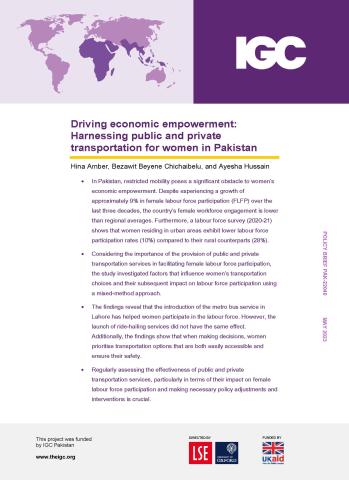Driving economic empowerment: Harnessing public and private transportation for women in Pakistan
-
Amber et al Policy brief May 2023
PDF document • 267.64 KB
- In Pakistan, restricted mobility poses a significant obstacle to women’s economic empowerment. Despite experiencing a growth of approximately 9% in female labour force participation (FLFP) over the last three decades, the country’s female workforce engagement is lower than regional averages. Furthermore, a labour force survey (2020-21) shows that women residing in urban areas exhibit lower labour force participation rates (10%) compared to their rural counterparts (28%).
- Considering the importance of the provision of public and private transportation services in facilitating female labour force participation, the study investigated factors that influence women’s transportation choices and their subsequent impact on labour force participation using a mixed-method approach.
- The findings reveal that the introduction of the metro bus service in Lahore has helped women participate in the labour force. However, the launch of ride-hailing services did not have the same effect. Additionally, the findings show that when making decisions, women prioritise transportation options that are both easily accessible and ensure their safety.
- Regularly assessing the effectiveness of public and private transportation services, particularly in terms of their impact on female labour force participation and making necessary policy adjustments and interventions is crucial.


